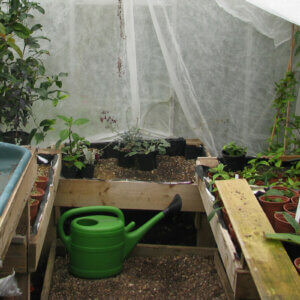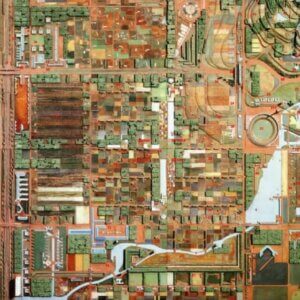Photo Credit by VeryGeeky.
 This article is a response to a Slate.com piece published by James McWilliams on June 6th, 2012.
This article is a response to a Slate.com piece published by James McWilliams on June 6th, 2012.
The article, titled “The Butcher Next Door: Why the rise of DIY urban animal slaughter is bad for people and animals,” tries to make the point that animal slaughter by untrained people in an urban residential setting will cause issues and should be stopped.
McWilliams’ article raises a good point: Do we need to regulate animal slaughter in an urban environment as the trend of urban homesteading increases? If so, to what extent?
Unfortunately, McWilliams takes a legitimate concern and polarizes the issue with a sloppily-written article.
Where McWilliams Gets It Wrong:
I considered going through the article point by point, but here’s the primary places where he gets off topic, takes a situation out of context, and sets up straw man arguments:
- He cites an article about 71 people being infected with salmonella in 2011 by backyard chickens and ducks, but fails to mention that it occurred because of chicks all acquired from a single hatchery that is a repeat offender.
- He quotes a woman telling BusinessWeek “[W]e just want to kill a chicken,” when the actual quote was “We don’t want to open up a slaughterhouse in the backyard, we just want to kill a chicken.” He also asserts that the woman was allowed to keep up to 40 animals on a 4,500 square foot property, without saying how many she actually had.
- Throughout the article he slants the entire urban agriculture movement as a hipster fad, and paints a picture of tattooed Pabst enthusiasts neglecting their once-trendy animals.
Valid Concerns With Urban Livestock & Slaughtering:
1) Raising Urban Livestock is a Huge Commitment, and Not For Everyone:
No argument here.
The time commitment? For chickens it’s less than our time commitment of a dog when you count daily dog walks, but still nothing to scoff at.
In financial terms, chickens don’t necessarily pay off over time. The primary factor is how much money and time is spent building or buying a chicken coop. Even a talented do-it-yourselfer can quickly spend hundreds of dollars on materials, negating most of the cost benefits of raising eggs at home (even if you’re paying $5 per dozen for organic-fed eggs at the store). At that point, you’re really just raising chickens for higher quality eggs, grown very locally, and the pleasure of the hens themselves.
2) Potential for Disease is a Valid Concern:
While he blows the issue out of proportion for the average persona keeping a few chickens, he’s correct that there’s potential for disease. However, basic education on hand washing and the risk of salmonella is enough to prevent the overwhelming majority of issues with ongoing care of healthy animals.
As far as the risk of contamination of slaughtered meat, I think it’s a very reasonable concern, which is the primary reason for my stance on point #3:
3) We Need to Regulate Commercial Sales of Home-Slaughtered Meat:
It’s one thing to slaughter a few chickens for your own personal use – I’m OK with that since your lack of care will only affect you (and hopefully not your family members).
However, it’s another thing to sell meat to others without taking additional precautions. I fully understand any city’s desire to restrict commercial meat production to professional operations, and not allow home-scale meat production.
That said, making regulations accessible for small operations is also important so long as they’re following good procedures. I think it’s equally wrong to restrict production to corporate-sized producers.
4) Well-Planned Urban Livestock Regulations Are Necessary:
While I think most cities need to reevaluate their existing restrictions on animals, I also think that limits need to be put in place on minimum space per animal and maximum number of animals on a property.
Examples like the ones cited by McWilliams of animal hoarders mistreating animals are terrible and absolutely need to be addressed for the animal’s welfare. But restricting the majority of us raising animals responsibly based upon the actions of that extremely small minority would be comparable to stopping us from owning cats and dogs because of the same minority of transgressions.
I wish the Slate article had been better written – it’s a fair topic of discussion and not something that we should sweep under the rug. By choosing to raise our own animals in a neighborhood we take on the responsibility for caring for them in a way that doesn’t seriously affect our neighbors.
What are your thoughts? At what point does slaughtering animals at home cross the line, if ever? Should home slaughters be regulated?









































This is really good information – I bet a lot urban homesteaders with small flocks tend to think of them as pets and might not be as careful as they should be. I keep five hens here in Los Angeles – I try to keep their coop and run as clean as possible but it’s smart to be vigilant.
It’s interesting that so much energy is put into fears of home slaughtering. Recall how many food-borne illnesses are caused by outbreaks in commercial slaughter houses salmonella, E. coli. Especially in Seattle lots of good information is available to help urban farmers raise and slaughter chickens humanely and responsibly.